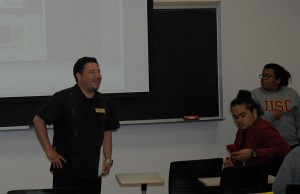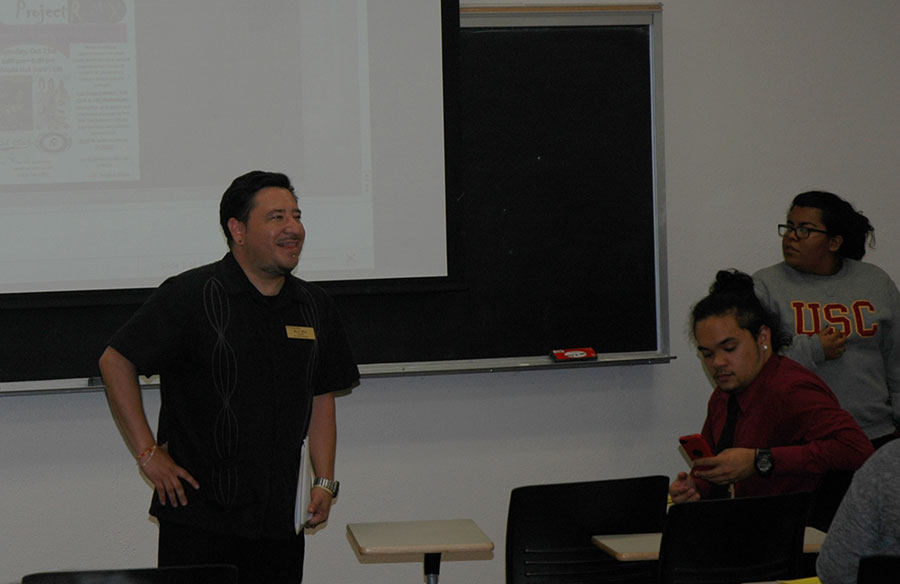Project ReMiX sparks discussion on culture
Asian Pacific American Student Services, Center for Black Cultural and Student Affairs and El Centro Chicano collaborated with the American Studies and Ethnicity Club and Panhellenic Council to host Project ReMiX: Cultural Appropriation or Appreciation: Naming It & Reclaiming It! -— an interactive dialogue on the fine line between cultural appropriation and cultural appreciation.

Mix it up · William Vela, director of El Centro Chicano, speaks to students at the Project ReMiX event Tuesday night in Mudd Hall. – Mac McDonough | Daily Trojan
Cultural appropriation refers to the use of another culture’s customs, ranging from costumes to behaviors, without permission from the community.
“Many students have expressed to us that there has been problems with cultural appropriation and cultural appreciation at USC, and that they would love a safe space to discuss it, raise awareness and come up with solutions together as a community with their fellow peers,” said William N. Vela, director of El Centro Chicano, in an email to the Daily Trojan.
The topic was an important one, due to many students’ personal experiences with cultural appropriation at USC in the recent past. The organizations aimed to create a safe platform for students to discuss the issue.
“Panhellenic Council partnered with the Cultural Center earlier this semester when we held diversity training workshops for the chapters, going through formal recruitment during recruitment school. In those workshops, we discussed the constructs surrounding stereotypes and assumptions,” said Harleen Marwah, vice president of external relations for the Panhellenic Council, in an e-mail to the Daily Trojan.
The event encouraged participants to work towards dissecting the constructs surrounding the distinction between appropriation and appreciation. Project ReMiX served as an interactive program that explores the intersectionality of identities of students from various ethnic and racial backgrounds. In order to create a culture of inclusion, Project ReMiX aimed to educate, engage and empower participants to understand how the complexity of their identities are linked to issues of social justice.
“Research indicates that the cultural appropriation is an issue in colleges and universities across the country: it is a very timely and relevant topic to discuss. We also want to take a proactive approach and raise awareness amongst our student body, while also building stronger relationships of students across disciplines and groups ultimately leading to stronger community, more informed decision making and hopefully more collaborations,” Vela said in an email to the Daily Trojan.
As the name suggests, the session was geared toward a diverse student population. In addition to Greek women, USC students from all parts of the campus community attended the Project ReMix.
“Discussing these topics amongst peers allows for topics to be relevant and pertinent to USC student life,” Vela said in an email.
Many associations collaborated to make the event a massive success.
“We truly enjoyed working with the Cultural Center on that initiative and look forward to many more partnerships in the future,” Marwah said.
The event began with a video; “Dear White People,” which depicted many instances of cultural appropriation. The event included a presentation on the definition of cultural appropriation, which can occur in sports mascots, theme parties, clothing and tattoos and the Proactive Campaign. The audience was divided into groups to discuss several topics related to cultural appropriation.
Many students voiced their opinion about the difficulty in drawing a fine line between cultural appreciation and appropriation. A wide range of incidents were quoted, ranging from Halloween costumes to hair appropriation.
“I definitely learned a lot from everyone’s personal perspectives, and I want to work harder at keeping those around me culturally aware in the future,” said Alex Rehberger, a sophomore majoring in stage management.

